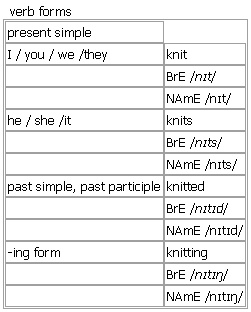 knit
knit

knit [knit knits knitted knitting] verb, noun BrE [nɪt] NAmE [nɪt]
verb (knit·ted, knit·ted) In senses 3 and 4 knit is usually used for the past tense and past participle.
1. transitive, intransitive to make clothes, etc. from wool or cotton thread using two long thin knitting needles or a machine
•~ (sth) I knitted this cardigan myself.
• Lucy was sitting on the sofa, knitting.
•~ sb sth She's knitting the baby a shawl.
2. transitive, intransitive ~ (sth) to use a basic ↑stitch in knitting
•Knit one row, purl one row.
3. transitive, intransitive ~ (sb/sth) (together) to join people or things closely together or to be joined closely together
•a closely/tightly knit community (= one in which relationships are very close)
•Society is knit together by certain commonly held beliefs.
4. intransitive, transitive ~ (sth) (of broken bones)to grow together again to form one piece; to make broken bones grow together again
Syn: ↑mend
•The bone failed to knit correctly.
Verb forms: 
Word Origin:
Old English cnyttan, of West Germanic origin; related to German dialect knütten, also to ↑knot. The original sense was ‘tie in or with a knot’, hence ‘join, unite’ (sense 3); an obsolete Middle English sense ‘knot string to make a net’ gave rise to sense 1.
Idiom: ↑knit your brow
noun usually plural
a piece of clothing that has been knitted
•winter knits
Word Origin:
Old English cnyttan, of West Germanic origin; related to German dialect knütten, also to ↑knot. The original sense was ‘tie in or with a knot’, hence ‘join, unite’ (sense 3); an obsolete Middle English sense ‘knot string to make a net’ gave rise to sense 1.
|
|
